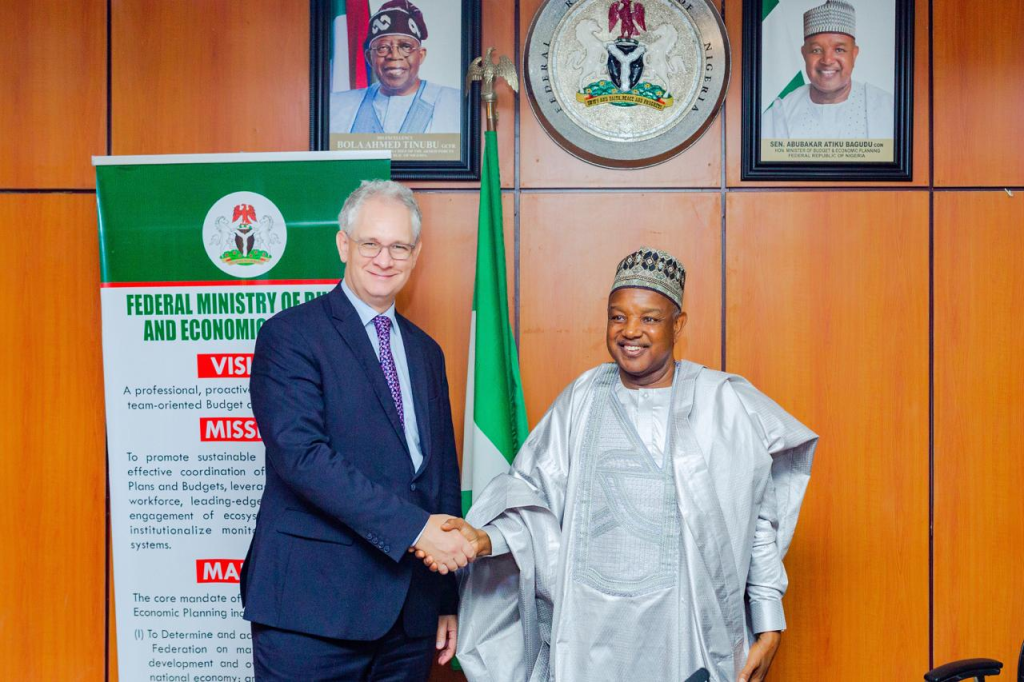By Progress Godfrey, Abuja
Nigeria and the International Monetary Fund (IMF) have intensified consultations on the country’s reform agenda and medium-term growth plans, as both sides work toward shaping Nigeria’s 2026–2030 National Development Plan.
A high-level IMF delegation led by Assistant Director of its African Department, Mr. Axel Schimmelpfennig, met on Friday with the Minister of Budget and Economic Planning, Senator Abubakar Bagudu, in Abuja.
The talks focused on Nigeria’s ongoing fiscal reforms, macroeconomic framework, and development priorities ahead of the IMF’s next country report.
In his remarks, Schimmelpfennig commended Nigeria’s reform drive and said the IMF was keen on understanding how the country’s medium-term strategy aligns with its broader development goals.
‘We would like to hear your thoughts on current developments — your outlook for the next year and the medium term.
“We understand that you are preparing the medium-term framework, the National Development Plan, and the 2026 budget. Having your overall vision at this stage will be extremely helpful,” he stated.
He noted that while pre-election seasons often present uncertainties, Nigeria’s continued policy consistency demonstrates its growing institutional maturity.
Every country manages pre-election periods differently. What we see in Nigeria is a continued commitment to reform and policy consistency — a signal of growing institutional strength,” Schimmelpfennig observed.
“Every country manages pre-election periods differently,” Schimmelpfennig observed, noting that what Nigeria has proven its continued commitment to reform and policy consistency, which shows growing institutional strength.
Responding, Senator Bagudu reaffirmed the government’s commitment to aligning fiscal reforms with national planning to ensure coherence, efficiency, and inclusive growth.
He expressed appreciation for the IMF’s ongoing technical support and constructive engagement over the years.
He said, “We are deeply grateful for the guidance and encouragement we have received from the IMF and World Bank. Your interrogation and feedback have played a vital role in refining our reforms and ensuring that our economic management remains evidence-based.”
The minister explained that Nigeria’s reform journey under President Bola Tinubu is built on discipline, inclusion, and transparency, values that are already yielding measurable progress.
He added that the administration’s target of building a $1 trillion economy by 2030 is anchored on sustained reforms and coordinated planning, with the Renewed Hope Ward-Based Development Plan serving as a framework for inclusive, bottom-up economic growth.
Bagudu highlighted that the forthcoming 2026–2030 National Development Plan would integrate federal, state, and local strategies into a unified, data-driven framework for sustainable development.
“We are working to make the plan a reflection of Nigeria’s collective ambition — one that incorporates fiscal discipline, subnational collaboration, and the reforms necessary to sustain long-term growth,” he said.
He further noted the importance of the IMF’s collaboration on macroeconomic modelling, fiscal planning, and comparative data analysis to strengthen policy design.
“We are not lamenting; we are learning and refining. Our partnership with the IMF is about innovation, not dependency, and will continue to guide Nigeria’s reform-driven path towards sustainable growth,” the minister stated.
The post Nigeria, IMF deepen talks on 2026–2030 economic reform, growth plans appeared first on Vanguard News.

